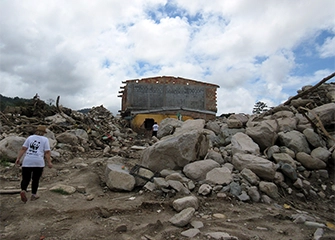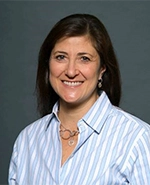Protecting the World’s Rivers
A legal exploration of transboundary governance and resource diversion with World Wildlife Fund

“The work quality, creativity, interest, and enthusiasm that we’ve found at Northwestern have made this a delightful partnership. I can’t sing the praises of the students and professors enough,” says Anita van Breda, Senior Director of Environment and Disaster Management at World Wildlife Fund (WWF).
WWF, one of the world’s leading environmental organizations, recently partnered with Northwestern Pritzker School of Law’s Environmental Advocacy Center (EAC)on a new experiential learning project aimed at understanding environmental law frameworks in Latin America and the Caribbean. The project was offered through the Environmental Advocacy Clinic course, which pairs clients and organizations like WWF with law students who provide real-world legal assistance under the tutelage of EAC Director and Clinical Associate Professor Nancy Loeb.
“My role was digging into the country-specific laws. Then I boiled down the most important and practical components of my research for WWF and its partners who are doing environment and disaster work on the ground,” says second-year Northwestern law student Emma Clouse who worked on the project.

“Emma did an amazing job of taking advantage of the research resources available across Northwestern,” says Loeb. “She was very successful in combining her research learning with practical guidance for WWF on legal and disaster management frameworks in countries threatened by extreme weather and geologoical events.”
In her analysis, Clouse focused on the countries of Guatemala, Jamaica, and Colombia, looking at the interaction between environmental law and disaster risk management policies—including climate change—in each of them. Her research will support the daily operations of WWF’s Environment and Disaster Management Program, which works with humanitarian and development agencies around the world to integrate environmental considerations into disaster recovery, reconstruction, and risk reduction programs and policies.
“Our work with WWF has given students this extraordinary opportunity not only to learn about the law, but actually to experience it.” — Nancy Loeb, Clinical Associate Professor of Law and Environmental Advocacy Center Director

Van Breda stresses that when international humanitarian agencies enter a country to respond to an emergency situation, they should be mindful of local environmental laws and regulations as they do their work. Making that information readily available in a way that can be quickly reviewed and understood during a time of disaster will help support successful recovery and reconstruction.
“One of the issues that’s come up at WWF repeatedly over the years as we work with partners on the ground is lack of knowledge related to the environmental laws and regulations of specific countries,” says van Breda, who has more than 20 years’ experience working in conservation and disaster management. “Northwestern’s ability to survey current environmental- and climate-related laws and policies and organize that information in a succinct way has been of great value to us. Our staff doesn’t have the time, expertise, or access to the legal resources that the Law School does.”

In addition to providing a valuable work product for WWF, the experiential learning course also benefited Clouse by supplying her with real-world professional experience.
“I wanted to take the [Environmental Advocacy] Clinic to finally gain some practical experience that feels so far away when you’re a first-year law student. I was really eager to start taking courses that would give me a spot on the ground,” she says. “Working with WWF was great and really interesting, and Professor Loeb’s input was phenomenal. Once I had a draft of my report, WWF could immediately send it to people on the ground in these specific countries for their feedback. It was a comfort to me as a researcher because their local partners could give me insight into the way that laws are actually implemented on the ground. It was exciting to work with an organization with such a wide reach.”
EAC Director Nancy Loeb adds that one of the great benefits of the course is that it provides the opportunity for students to gain experience working with clients and partners to develop strategies for addressing actual problems. “Our work with WWF has given students this extraordinary opportunity not only to learn about the law, but actually to experience it,” says Loeb.
“It’s very helpful working with ISEN in terms of centralized coordination, strategic thinking, and reaching across campus.” — Anita van Breda, Senior Director of Environment and Disaster Management at World Wildlife Fund
Collaboration with the Law School is just one component of Northwestern’s institutional partnership with WWF, which is managed by the Institute for Sustainability and Energy at Northwestern (ISEN) on behalf of the university. As a university-wide entity, ISEN develops strategic alliances with corporate, civic, academic, and not-for-profit partners, leveraging shared expertise and resources across disciplines for impactful solutions.
“It’s very helpful working with ISEN in terms of centralized coordination, strategic thinking, and reaching across campus,” van Breda says. “I think that’s one of the fundamentals to trying to support and nurture collaboration between two large and diverse institutions. ISEN has been willing to take this journey with WWF and think big. But at the same time, I think the ISEN team also values—as we do—the benefit of thinking a bit smaller in more practical and applied terms. We’re delivering real outcomes that make an impact.”
Clouse emphasizes that her experience working with WWF only heightened her professional interest in international and environmental topics. This spring, she is focusing on international mining issues as part of a similar experiential learning course on human rights.